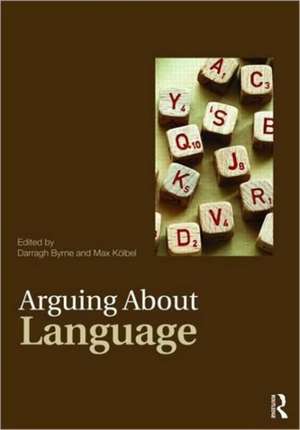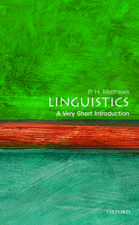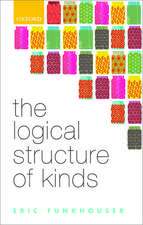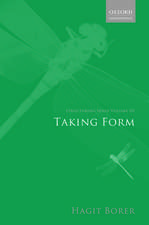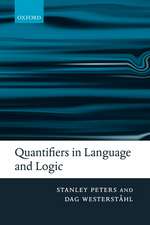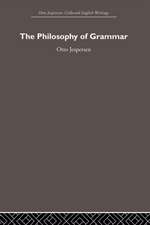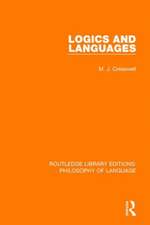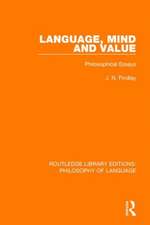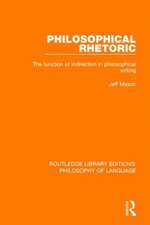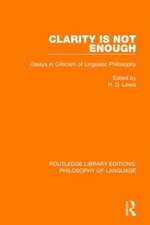Arguing About Language
Editat de Darragh Byrne, Max Kolbelen Limba Engleză Paperback – 21 dec 2009
Classic readings from Frege, Russell, Kripke, Chomsky, Quine, Grice, Lewis and Davidson appear alongside more recent pieces by philosophers or linguists such as Robyn Carston, Delia Graff Fara, Frank Jackson, Ernie Lepore & Jerry Fodor, Nathan Salmon, Zoltán Szabó, Timothy Williamson and Crispin Wright. Organised into clear sections, readings have been chosen that engage with one another and often take opposing views on the same question, helping students to get to grips with the key areas of debate in the philosophy of language, including:
- sense and reference
- definite descriptions
- linguistic conventions
- language and behaviour
- descriptivism and rigidity
- contextualism
- vagueness
- rule-following and normativity
- fictional discourse.
Arguing About Language is an ideal reader for students looking for a balanced yet up-to-date introduction to the philosophy of language.
Darragh Byrne is lecturer in philosophy at the University of Birmingham, UK.
Max Kölbel is ICREA Research Professor at the University of Barcelona, Spain. He is the author of Truth without Objectivity (Routledge, 2002) and co-editor of Wittgenstein's Lasting Significance (Routledge, 2004) with Bernhard Weiss, as well as Relative Truth (Oxford, 2008) with Manuel García-Carpintero.
Preț: 330.42 lei
Preț vechi: 424.75 lei
-22% Nou
Puncte Express: 496
Preț estimativ în valută:
63.23€ • 65.62$ • 52.85£
63.23€ • 65.62$ • 52.85£
Carte tipărită la comandă
Livrare economică 15-29 martie
Preluare comenzi: 021 569.72.76
Specificații
ISBN-13: 9780415462440
ISBN-10: 0415462444
Pagini: 614
Dimensiuni: 178 x 254 x 33 mm
Greutate: 0.48 kg
Ediția:1
Editura: Taylor & Francis
Colecția Routledge
Locul publicării:Oxford, United Kingdom
ISBN-10: 0415462444
Pagini: 614
Dimensiuni: 178 x 254 x 33 mm
Greutate: 0.48 kg
Ediția:1
Editura: Taylor & Francis
Colecția Routledge
Locul publicării:Oxford, United Kingdom
Public țintă
UndergraduateCuprins
Introduction Part 1: A Homeric Struggle: Communication and Truth 1. Meaning H. Paul Grice 2. Meaning and Truth Peter Strawson 3. Language and Communication Michael Dummett Part 2: Sense and Reference 4. On Sense and Reference Gottlob Frege 5. Frege’s Puzzle Nathan Salmon Part 3: Definite Descriptions: Quantifiers or Singular Terms? 6. Descriptions Bertrand Russell 7. On Referring Peter Strawson 8. Mr Strawson on Referring Bertrand Russell Part 4: Rigidity vs. Descriptivism 9. Naming and Necessity Saul Kripke 10. Reference and Descriptions Revisited Frank Jackson Part 5: Analyticity 11. Two Dogmas of Empiricism W. V. Quine 12. In Defense of a Dogma H. Paul Grice and Peter Strawson Part 6: Truth and Meaning 13. Truth and Meaning Donald Davidson 14. Meaning and Truth Theory John Foster Part 7: Meaning, Intention and Convention 15. Languages and Language David K. Lewis 16. A Note on 'Languages and Language' John Hawthorne 17. A Chomskian Alternative to Convention-Based Semantics Stephen Laurence Part 8: Knowledge of Language 18. Knowledge of Language Noam Chomsky 19. Semantic Theory and Tacit Knowledge Gareth Evans 20. Theories of Meaning and Speakers’ Knowledge Crispin Wright Part 9: Meaning, Holism and Inferential Role 21. Why Meaning (Probably) Isn’t Conceptual Role Ernest Lepore and Jerry Fodor 22. Is Compositionality Compatible with Holism? Peter Pagin Part 10: Implicature 23. Logic and Conversation H. Paul Grice 24. Linguistic Meaning, Communicated Meaning and Cognitive Pragmatics Robyn Carston Part 11: Compositionality and Context 25. Against compositionality: the case of adjectives Ran Lahav 26. Adjectives in context Zoltan Szabo Part 12: Rule-following and Normativity 27. Kripke’s Account of the Argument against Private Language Crispin Wright 28. Semantic Normativity Asa Wikforss Part 13: Metaphor 29. What Metaphors Mean Donald Davidson 30. How Metaphors Work: a Reply to Donald Davidson Max Black Part 14: Vagueness in Language 31. Vagueness, Logic and Ontology Achille Varzi 32. Vagueness and Ignorance Timothy Williamson 33. Shifting sands: an interest-relative theory of vagueness Delia Graff Fara Part 15: Fictional Discourse 34. Truth in Fiction David K. Lewis 35. Talk about Fiction Stefano Predelli 36. Speaking of Fictional Characters Amie L. Thomasson
Recenzii
When first I read it my immediate thought was: I would like to use this book for a philosophy of language course. There is, I think, a fine balance between classic and contemporary readings. And one thing I find especially laudable is that instead of, somewhat mindlessly, having chosen the most well-known readings on a topic, the editors have gone for quality and so have made some unconventional choices.
Matti Eklund, Cornell University, USA
Byrne and Kölbel have chosen well. Their fifteen parts span the full spectrum of topics in philosophy of language. Each part includes two or three pivotal and provocative readings. Some are by household names like Russell and Chomsky. Others are little known gems that will pleasantly surprise even experts. The editors also do a superb job of helping readers to appreciate the import and value of the debates. The full package – the readings, overviews, guidance questions, and pointers to further readings – should enable students and others to discover and engage with opposing views in a fascinating and resurgent field of philosophy.
Alex Barber, The Open University
Matti Eklund, Cornell University, USA
Byrne and Kölbel have chosen well. Their fifteen parts span the full spectrum of topics in philosophy of language. Each part includes two or three pivotal and provocative readings. Some are by household names like Russell and Chomsky. Others are little known gems that will pleasantly surprise even experts. The editors also do a superb job of helping readers to appreciate the import and value of the debates. The full package – the readings, overviews, guidance questions, and pointers to further readings – should enable students and others to discover and engage with opposing views in a fascinating and resurgent field of philosophy.
Alex Barber, The Open University
